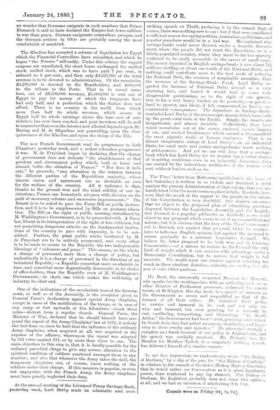At the annual meeting of the Liverpool Penny Savings-Bank, yesterday
week, Lord Derby made an admirable and even
striking speech on Thrift, prefacing it by the remark that, of course, there was nothing new to say ; but if that were considered. a sufficient reason for saying nothing, journalists, politicians, and popular preachers would be in a bad way. He explained why savings-banks could never flourish under a despotic Govern- ment, where the people did not trust the Executive ; or in a thinly-populated country, where they must be far too sparsely scattered to be easily accessible to the savers of small sums. The money deposited in English savings-banks is now about 741 millions sterling, or about one-tenth of the National Debt; and nothing could contribute more to the best mode of reducing the National Debt, the creation of terminable annuities, than the increase of the Savings-Banks Fund. Lord Derby re- garded the increase of National Debts abroad as a very alarming fact, and feared it would lead to some very disagreeable questionings as to the right of one genera. tion to lay a very heavy burden on its posterity,—a questim hard to answer, and likely, if left unanswered, to lead to un- comfortable consequences. The depositors iu Saviugs-Banks reminded Lord Derby of the microscopic insects which have built up the great coral reefs of the Pacific. Singly, the insects are insignificant, and almost invisible. Collectively, they have raised mountains out of the ocean, enclosed square leagues of sea, and erected breakwaters which exceed a thousandfold. the most gigantic works of human engineers. That is an almost imaginative eulogy of Lord Derby's on an industrial State, for coral reefs and penny savings-banks know nothing of aristocracies. And yet no one will deny that a savings- bank which has Lord Derby for its trustee has a better chance of inspiring confidence even in an industrial democracy, than one erected by the industrious multitudes of the human coral reef, without leaders such as he.


































 Previous page
Previous page